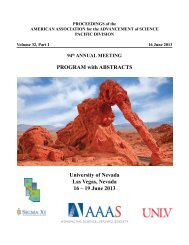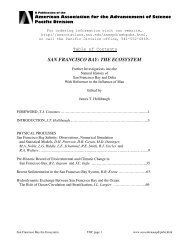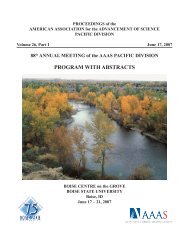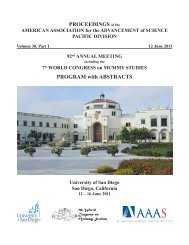Vol 31, Part I - forums.sou.edu ⢠Index page - Southern Oregon ...
Vol 31, Part I - forums.sou.edu ⢠Index page - Southern Oregon ...
Vol 31, Part I - forums.sou.edu ⢠Index page - Southern Oregon ...
Create successful ePaper yourself
Turn your PDF publications into a flip-book with our unique Google optimized e-Paper software.
SYMPOSIA – Tuesday<br />
Tuesday, 26 June 2012<br />
Computability and Complexity<br />
in Mathematics, Session II<br />
ponderosa pines 1 & 2<br />
Program continues from Monday.<br />
Please refer to <strong>page</strong> 24 of these Proceedings<br />
for the full description of the program.<br />
Tuesday, 9:00 a.m. – 11:25 a.m.<br />
Program Co-Chairs: Jens Harlander and Marion Scheepers<br />
9:00 43 Elliptic Curves: From Diophantus to Modern<br />
Cryptography, LAWRENCE C WASHINGTON<br />
(Department of Mathematics, University of Maryland,<br />
College Park, MD 20742; lcw@umd.<strong>edu</strong>).<br />
11:10 45 Symmetric Key Cryptography Over Non-binary<br />
Algebraic Structures, LILJANA BABINKOS-<br />
TOVA 1 , KAMERYN WILLIAMS 1 *, ALYSSA<br />
BOWDEN 2 , and ANDREW KIMBALL 3 ( 1 Department<br />
of Mathematics, Boise State University; 2 Department<br />
of Mathematics, Loyola Marymount University;<br />
3<br />
Department of Mathematics and Computer Science,<br />
Western Carolina University).<br />
Following this symposium Tuesday afternoon will be the workshop,<br />
Programmed Genome Remodeling in Ciliates and Computing.<br />
In the middle of the workshop will be the contributed paper,<br />
Cantor’s Original Proof that the Reals are Uncountable. For information<br />
about the workshop, please refer to <strong>page</strong> 35 of these Proceedings.<br />
For information about the oral presentation, please refer to<br />
<strong>page</strong> 40 of these Proceedings.<br />
9:50 44 Computability and Complexity in Elliptic Curves<br />
and Cryptography, KEVIN BOMBARDIER 1 *,<br />
MATTHEW COLE 2 , THOMAS MORRELL 3 ,<br />
and CORY SCOTT 4 ( 1 Department of Mathematics,<br />
Wichita State University; 2 Department of Mathematics,<br />
University of Notre Dame; 3 Department of Mathematics,<br />
Washington University in St. Louis; 4 Department<br />
of Mathematics, Colorado College).<br />
10:10 44 Computability and Complexity in Elliptic Curves<br />
and Cryptography, KEVIN BOMBARDIER 1 ,<br />
MATTHEW COLE 2 , THOMAS MORRELL 3 *,<br />
and CORY SCOTT 4 ( 1 Department of Mathematics,<br />
Wichita State University; 2 Department of Mathematics,<br />
University of Notre Dame; 3 Department of Mathematics,<br />
Washington University in St. Louis; 4 Department<br />
of Mathematics, Colorado College).<br />
10:30 44 Computability and Complexity in Elliptic Curves<br />
and Cryptography, KEVIN BOMBARDIER 1 ,<br />
MATTHEW COLE 2 , THOMAS MORRELL 3 ,<br />
and CORY SCOTT 4 * ( 1 Department of Mathematics,<br />
Wichita State University; 2 Department of Mathematics,<br />
University of Notre Dame; 3 Department of Mathematics,<br />
Washington University in St. Louis; 4 Department<br />
of Mathematics, Colorado College).<br />
10:50 44 Computability and Complexity in Elliptic Curves<br />
and Cryptography, KEVIN BOMBARDIER 1 ,<br />
MATTHEW COLE 2 *, THOMAS MORRELL 3 ,<br />
and CORY SCOTT 4 ( 1 Department of Mathematics,<br />
Wichita State University; 2 Department of Mathematics,<br />
University of Notre Dame; 3 Department of Mathematics,<br />
Washington University in St. Louis; 4 Department<br />
of Mathematics, Colorado College).<br />
Biofuel: Computational Modeling<br />
of Cellulose and Cellulase<br />
douglas fir 1 & 2<br />
Tuesday<br />
9:00 a.m. – 11:50 a.m.<br />
Program organizer: C. Mark Maupin (Department of Chemical<br />
and Biological Engineering, Colorado School of Mines).<br />
Program sponsored by the Pacific Division section on Computer<br />
and Information Sciences.<br />
The ever increasing world-wide demands for energy, along<br />
with uncertain petroleum <strong>sou</strong>rces and the possibility of<br />
global climate change, has dictated the necessity for our<br />
nation to develop a sustainable and renewable alternative<br />
to fossil transportation fuel. Biofuels derived from lignocellulosic<br />
biomass are attractive alternatives due to the vast<br />
infrastructure already in place for the distribution of a liquid<br />
transportation fuel, and the fact that fuel derived from<br />
cellulose does not compete with human and livestock food<br />
re<strong>sou</strong>rces. Furthermore, since cellulose is the most abundant<br />
renewable biopolymer on earth, the feedstock for cellulosic<br />
biofuels is almost inexhaustible and the utilization of cellulose<br />
for liquid fuel can achieve zero net carbon dioxide emission,<br />
thereby making it a crucial component in our efforts to<br />
r<strong>edu</strong>ce greenhouse gases.<br />
Cellulosic biofuels are created by hydrolyzing cellulose<br />
to glucose and subsequently fermenting the glucose to make<br />
biofuel. Several major obstacles remain with regard to the<br />
viability of cellulosic biofuels including overcoming the natural<br />
resistance of cellulose to enzymatic depolymerization,<br />
known as biomass recalcitrance, which is primarily responsible<br />
for the high cost of cellulosic biofuels. To formulate<br />
ways to overcome biomass recalcitrance, a basic understanding<br />
of the substrate and enzymes involved in the hydrolysis<br />
1100 (time italicized and underlined) identifies a student presentation 27<br />
* identifies the speaker from among several authors listed<br />
63 (bolded number) is the abstract number<br />
abstracts contain complete contact information for authors








